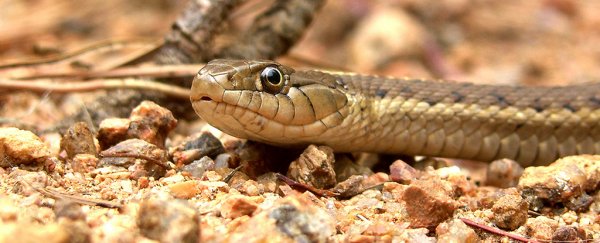If you get bitten by a venomous snake, there are medicines that can help, but these antivenoms are specific to each species of snake, and have to be kept refrigerated before use, which means you'd better hope that wherever you are has enough to adequately treat you.
But all that could be about to change, with researchers in the US announcing that they're in the early stages of developing a snakebite antidote that can fight 28 common venoms and be administered out in the field without the help of a doctor.
One of the difficulties in developing a snakebite antidote is that snakes can kill in a variety of different ways: paralysis, tissue damage, and blood clotting (or all three). To be effective, a drug needs to combat all of these biochemical reactions.
To begin their search, a team led by Matt Lewin from the California Academy of Sciences focussed on an enzyme called sPLA2, which is found in snake venom and is also produced by the human body during inflammation.
After collecting compounds that had been tested against sPLA2 in clinical trials for other conditions, the next job was to mix venoms and antidotes and then use a colour indicator to measure levels of sPLA2. One drug in particular stood out: varespladib, an sPLA2 inhibitor originally developed to tackle wound infections.
Lewin asked researchers at the Yale Centre for Molecular Discovery to run a series of tests pitting varespladib against 28 different venoms, including those from the black mamba, Russell's viper, Indian cobra, cape cobra, krait, coastal taipan, eastern coral snake, South American rattlesnake, and the banded sea krait. The new drug was found to incapacitate sPLA2 in each case.
Those results were backed up with tests on rats, where doses of varespladib were found to reduce sPLA2 and prevent death-by-artificially-induced-snakebite.
While that all sounds pretty exciting, the results have yet to be published - they were recently presented to attendees at Venom Week at East Carolina University this week, and the team is now writing up the results of the trials for peer-review. So there's still a lot of work to be done, but the initial results are promising.
As Sarah Scoles from Stat reports, Lewin is an emergency medical doctor by trade, and wants to develop the drug to prevent some of the tens of thousands of deaths that happen due to snakebites every year.
He's applied for a patent to use varespladib to treat snakebites specifically - this is known as a "drug repositioning", where new rights are issued if a company wants to change the formulation, delivery mechanism, or utility of a drug.
With funds from friends, family, and other investors, Lewin is now looking to prepare a drug for human trials. While he's eager to push forward with the antidote's development, he knows corners can't be cut: "For me, this can't move fast enough," he told Scoles. "But safety is the first concern."
Edit: Snake venom expert, Bryan Grieg Fry from the University of Queensland in Australia, has responded to this research, saying that while this antivenom could work against one type of snake toxin, it will never work against them all, and as such, we have removed the descriptor "universal" from our headline.
